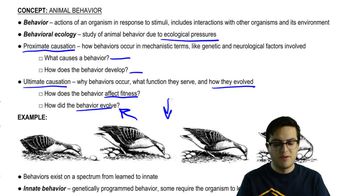What do ultimate explanations of behavior focus on?

Is it true that all organisms forage optimally? Why or why not?
 Verified step by step guidance
Verified step by step guidance
Verified video answer for a similar problem:
Key Concepts
Optimal Foraging Theory

Environmental Constraints

Behavioral Ecology

A behavior is considered adaptive if it increases an individual's fitness. How is fitness measured? Select True or False for each statement.
T/F Strength
T/F Body size
T/F Speed
T/F Number of viable offspring
Why does altruism seem paradoxical?
a. Sometimes altruistic behavior is actually selfish.
b. Altruism does not actually help others.
c. Alleles that cause an organism to behave altruistically should be selected against since these alleles should lower the organism's fitness.
d. Animals behave altruistically to help the species, but sometimes their behavior harms the species.
The male cuttlefish in the chapter-opening photo can rapidly change their skin colors (under nerve control) to flash warning patterns to rivals. Predict the proximate and ultimate causes of this behavior.
Propose an evolutionary hypothesis to explain the observation that some bird populations do not migrate if people supply food for them in feeders.
Hamilton's rule states that an altruistic allele could spread in a population if Br > C, where B represents the fitness benefit to the recipient, r is the coefficient of relatedness between altruist and recipient, and C represents the fitness cost to the altruist. If r = 0.5 between the altruist and the recipient, what would the ratio of costs to benefits have to be for the altruistic allele to spread?
a. C/ B > 0.5
b. C/ B > 0
c. C/ B < 0.5
d. C/ B < 0
